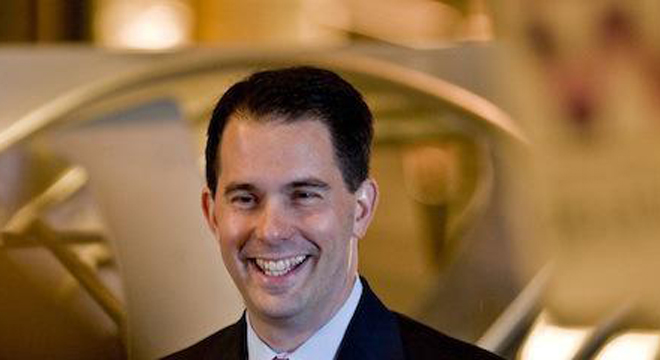Scott Walker’s victory in Wisconsin has generated more wild theories than the screenplay for “Prometheus,” with commentators claiming it as a harbinger of everything from the death of public-sector unions to a Mitt Romney victory in November to a Walker vice-presidential nomination and even a presidential bid of his own.
Adding another voice to the pile, Walker offered a broad assessment of what he thought his experience in Wisconsin meant in a breakfast meeting with reporters in Washington, D.C. on Thursday hosted by the Christian Science Monitor.
“Let me step back for a second,” Walker said, after over a dozen questions on Wisconsin’s impact and his thoughts on what the GOP could do to build on it. “I read a lot of commentaries on our victory that I think overstated it in either direction.”
“I think there are people on the left who say this had no impact, it was all about the money, and I think that’s completely wrong. And I think there are people on the right who think that this means every Republican is going to win and you can apply this to every state and every jurisdiction. But I think the truth is somewhere in between.”
But he made no bones about predicting big things for conservative opponents of labor unions in the wake of his success limiting collective-bargaining rights for most public-sector employees in the state.
Before, Walker said, the prevailing belief was that “big government union leaders thought no one would ever dare to make the kind of changes we made,” and if anyone did, labor would be quick to “punish us” as an example. No longer, he predicted, would officials be scared off from attempting similar changes.
“My interest is in governing, and I don’t think they’ll have that kind of influence because the kind of bullying tactics that they used before just won’t work,” he said.
Walker demurred on whether Republican governors should pursue similar changes in other states after the next election.
“Every state’s a little bit different, but in our case you couldn’t make those changes unless you reformed collective bargaining,” he said.
As for the presidential election, Walker warned that his victory should not be taken as a sign of an impending Romney win in Wisconsin.
“I firmly believe that if Gov. Romney looks at Wisconsin and thinks that he can win just because I have an ‘R’ next to my name and he has an ‘R’ name … that’s not how he wins,” Walker said. “It wasn’t just Republicans and conservatives who got me elected.”
Walker stressed repeatedly that Romney needed to adopt the mantle of “reformer” by pushing a detailed plan to deal with the budget, even if it’s politically dangerous. That plan, he strongly implied, should hew close to the one proposed by fellow Wisconsinite Paul Ryan, whom Walker repeatedly talked up as a model for the party and a potential vice presidential pick.
“People are so cynical about politics that people who are willing to stick their neck out a little bit, I think there’s a great deal of reverence,” he said, citing Ryan as an example. “I think [Romney needs] to have a simple message of not only why we need to replace the current occupant of the White House, but also we he would be better.”
After a brutal year of protests and recall campaigns, Walker predicted his own agenda would grow quieter and more bipartisan as he pledged to turn to issues like education standards and worker-training programs next year that he hopes will bring some Democrats on board.
One potential minefield he suggested he wouldn’t pursue: right-to-work legislation, already in effect in many Republican-leaning states, which limits unions’ ability to recruit new members.
“We’re not going to go through that whole battle over again,” Walker said. Besides, he said, he considers private-sector unions an “ally” in many cases.






